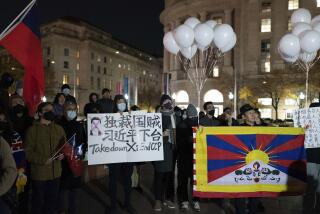China Puts End to Rare Public Protest in Capital
PEKING — A rare public protest by Chinese seeking to return from an impoverished area to Peking was put to an end Tuesday, and the authorities decreed that they still reserve the right to send city youths to the countryside.
“Supporting rural areas and border regions, developing inland and underdeveloped areas will continue to be the glorious tasks and obligations of the youth of the capital,” Peking Mayor Chen Xitong and local Communist Party Secretary Li Ximing told the demonstrators.
The custom of having young, educated Chinese from urban areas settle down in the countryside was not merely an aberration of China’s Cultural Revolution, these officials said.
Weeklong Sit-in
The demonstrators, estimated by the official New China News Agency to number about 300, were Peking natives who were sent out to Shanxi province in central China in 1968 during the Cultural Revolution. They had staged a weeklong sit-in on the steps of Peking’s municipal building to seek permission to move back to their hometown.
On Tuesday, however, Chinese newspapers and broadcasting stations announced that the highest-ranking officials in Peking had met with the demonstrators on Monday, “seriously criticized” them and told them to return home quickly.
The officials said the sit-in “disrupted public order”--thus making the demonstrators subject to criminal prosecution under Chinese law.
By early Tuesday morning, the steps of City Hall were vacant. Where the protesters had put up a sign that said “Save Us, Comrade (Deng) Xiaoping,” referring to China’s top leader, city workmen were busy erecting a sign for May Day celebrations.
Participants Photographed
There was no indication Tuesday that any of the demonstrators have been arrested or imprisoned, and Peking city officials were not available for comment. During the sit-in, uniformed Chinese police officers stood by taking pictures of the participants.
Most of the millions sent to the countryside during the Cultural Revolution have been allowed to return home, but some are still waiting for officials to approve the required change in household registration. Gaining permission is especially hard for married couples and for people seeking to return to China’s largest cities, such as Shanghai and Peking.
According to the official Chinese press accounts, Peking’s mayor and Communist Party secretary told the demonstrators that their sit-in was “entirely wrong.”
“Young people must have idealism and discipline and should return back to their own working units as soon as possible so as to make new contributions to the development of Shanxi,” the officials were quoted as saying.
No Right to Choose
Young people in China do not have the right to choose where they will live and work. Although in recent years there has been no mass dispersal of people to the countryside as there was during the Cultural Revolution, each year some unlucky city residents are assigned to jobs in remote areas.
“Their (the Chinese authorities’) main constituents are the peasants who make up 80% of the country, and they don’t want the peasants to think they give preferences to these boys from the big cities,” one Western analyst said Tuesday.
Ironically, the protesters--all of whom claim to be victims of the Cultural Revolution--were themselves accused of “adopting a practice of the Cultural Revolution” by engaging in a public protest.
More to Read
Sign up for Essential California
The most important California stories and recommendations in your inbox every morning.
You may occasionally receive promotional content from the Los Angeles Times.










